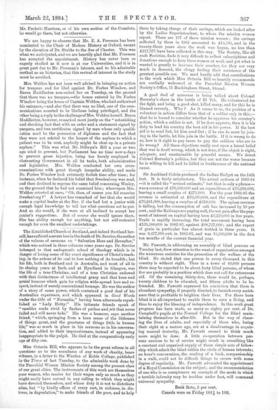Mr. Fawcett, in addressing an assembly of blind persons on
Tuesday last, drew attention to the want of organisation amongst the numerous societies for the promotion of the welfare of the blind. He stated that one person in every thousand in this country is without sight. Thus in a town of 40,000 persons there may be expected to be about forty blind persons, of whom five are probably in a position which does not call for extraneous aid. Of the remaining thirty-five, there would be, perhaps. twenty children to be educated, and fifteen adults to be be- friended. Mr. Fawcett expressed his conviction that there is abundant sympathy, if properly directed, to furnish every assist- ance that is profitable to brighten their lives. For those born blind it is all-important to enable them to earn a living, and thus to enjoy the blessing of independence. In this work great progress has been made, as many as eighty per cent. of Dr. Campbell's pupils at the Normal College for the Blind main- taining themselves in after-life. But in the way of cheer- ing the lives of adults, and especially of those who, losing their sight at a mature age, are at a disadvantage in acquir- ing manual dexterity, Mr. Fawcett seemed to think much more might be done. A little co-operation between per- sons anxious to be of service might result in something like a constant and organised supply of those simple acts of fellow- ship which admit the blind within the circle of human interests; an hour's conversation, the reading of a book, companionship in a walk, could not be difficult things to secure with some degree of regularity. Mr. Fawcett advocated the appointment of a Royal Commission on the subject; and the recommendation of one who is so conspicuous an example of the mode in which a terrible infirmity may be trodden under foot, will command.
universal sympathy.


































 Previous page
Previous page